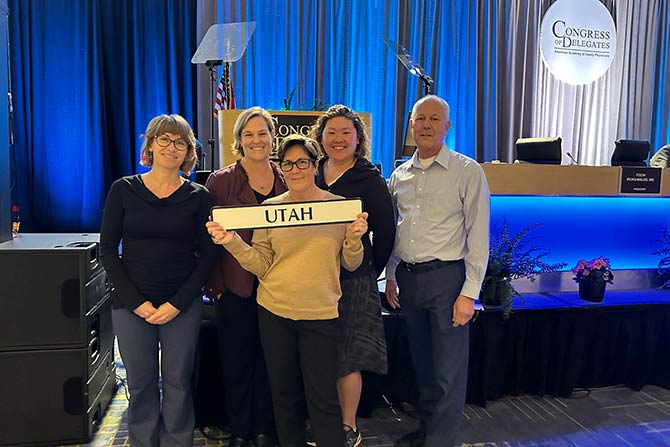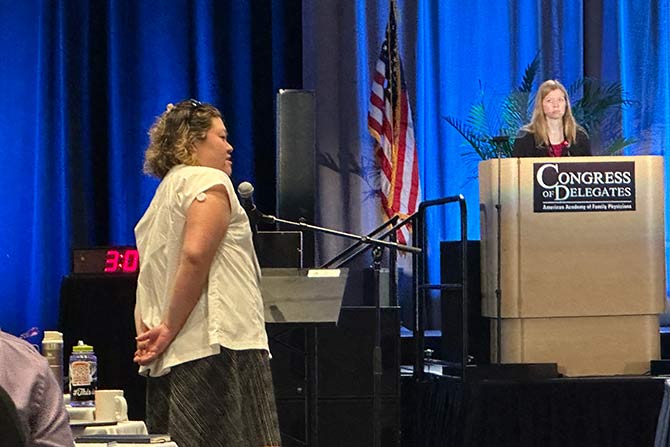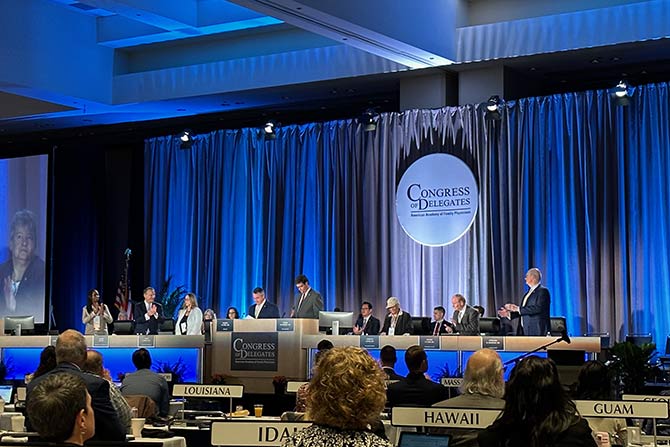The 2023 American Academy of Family Physicians Congress of Delegates was held October 24-27 in Chicago. As in previous years, resolutions were submitted by state chapters and debated during virtual reference committees. During the week’s general session meeting, resolutions are voted on, bylaws are updated, and delegates vote to elect new leadership of AAFP.
The Congress kicks off each year with a Town Hall. This is a more informal meeting where AAFP leadership makes brief statements on what the Board has been working on over the past year. The topics included AI/technology, GME funding changes to community centers, pay for family docs, continuing its ongoing work with diversity within the AAFP and several acts in the Congress, including allowing medical students to defer their loan repayments interest-free during residency.
Most of the time was spent allowing the members attending to ask questions of the AAFP leaders. Some of the topics included what is being done to combat non-compete clauses in contracts, getting a wRVU assigned to the G22.12 CPT code, getting more appropriate reimbursement for primary care and how to continue to encourage underrepresented minorities to pursue family medicine.
That evening, we joined with other delegations for the Western States Forum — an annual dinner meeting for delegates from Washington, Oregon, California, Montana, Idaho, Utah, Arizona, Wyoming, Colorado and New Mexico. It provided an opportunity to discuss specific areas of interest for our western states and helped encourage support for our resolutions.
Day two marked the start of organizational policymaking, with remarks from President Tochi Iroku-Malize, President-Elect Steven Furr and speaker Russel Kohl, who demonstrated his evergreen talent for filling technical delays with dad jokes. The opening call for new business brought forth three late resolutions from New England states. While resolutions typically undergo a submission and review process well before the convening of the Congress of Delegates, late resolutions may be proposed from the floor on the first day of business if the submitting delegates feel that an issue cannot wait until the following year.
These late-breaking resolutions must have a 2/3 supermajority to even be considered for debate, and this year, one resolution from Connecticut made the cut: a resolution to include an estimate of the reputational impact on the AAFP for future proposed organizational policy. Clearing this supermajority hurdle did not mean that the resolution passed; it would be debated on the floor the next day.
The day also brought forth the report of the Elected Leadership Nominations Process Committee. Under current procedures, the AAFP found itself in a place where leadership positions (AAFP Board, president-elect, speaker and vice-speaker positions) were only being selected from a minimal number of candidates, several of whom faced no opposition and repeatedly came from a small selection of states. As a medium chapter, we Utahns understood one of the major barriers well: Scraping together the resources to launch a national campaign was much harder for us than for a larger chapter with deeper pockets and greater manpower. The Process Committee was formed to help understand this as well as other issues that might be creating an uneven playing field.
A new bylaw was approved that created the Nominations Committee that will seek out viable candidates. The details of how this Nominations Committee would be formed were debated with numerous amendments and tendrils of confusing language until the speaker called for a recess, and the debate was left to continue to the next day.

Utah’s 2023-2024 Delegates and Alternates
Delegates
Thea Sakata, MD
Nikki Clark, MD, FAAFP
Alternate Delegates
David Cope, MD, FAAFP
Katharine Caldwell, MD, MPH
From L to R: Dr. Katherine Caldwell (alternate delegate), Dr. Nikki Clark (delegate), Maryann Martindale (UAFP CEO), Dr. Thea Sakata (delegate) and Dr. David Cope (alternate delegate).


Our third day of the Congress began with a report to the Congress from Executive Vice President and CEO Shawn Martin. In his address, Martin highlighted several ongoing activities of the national organization, such as fighting for the G2211 code, that, if allowed to go into effect as planned in 2024, would allow primary care physicians the ability to capture some of the complexity required to provide quality longitudinal care. He also discussed an effort to understand family physician compensation across the country and encouraged members to complete the Family Medicine “Know Your Worth” survey so that the AAFP can create a benchmarking dashboard. Finally, he reviewed the AAFP strategic plan and outlined six key priorities for moving Family Medicine (FM) forward:
- Financing for primary care and the need to secure better investment in primary care. AAFP has called upon the AMA to help modernize the current payment system to one that appropriately values FM and primary care.
- Physician Autonomy: “FMs are at our best when in service to our patients, not corporations.”
- Comprehensiveness and Continuity of Care: Family docs have a unique ability to meet the needs of a community; we need to better create a marketplace that allows this.
- Practice Experience: Supporting all innovations in PC delivery; AAFP is engaged to support members to use AI correctly.
- Inclusiveness: Family Medicine, including AAFP leadership, should be representative of the communities they serve.
- Family Medicine Workforce: FM needs a stronger presence on medical school campuses to encourage students to go into family medicine.
The day began with reference committee recommendation reports and floor debate for extracted resolutions. Utah’s resolution asking the AAFP to establish a national Family Medicine Week passed as written with reference committee support. Debate also resumed over the formation of the Nominating Committee, concluding with a new process to be enacted for the 2024 cycle. Under this new system, small and medium chapters such as Utah and many other western states will have a more level playing field upon which to run candidates for the AAFP board, speaker, vice-speaker and president-elect positions.
The last day of the Congress of Delegates started off with delegates voting for a new president-elect. While awaiting the results of this vote, the Congress dealt with the remaining resolutions. We heard strong, supportive testimony for the resolution our chapter had proposed asking the AAFP to advocate for hospitals to grant trained family physicians privileges to perform deliveries and for adequate obstetrical training in residencies. We were glad to see this resolution pass and to have support for an issue we all felt passionate about, recognizing that all family physicians need to be competent in the care of the pregnant patient, even if they do not provide prenatal care.
After a lighter exchange of jokes from the speakers and the Congress members, Dr. Steven Furr recognized outgoing President Dr. Tochi Iroku-Malize for her service and gave a speech to the Congress accepting his new role as President. Election results were revealed, and we are excited to welcome Dr. Jenn Brull as the new President-Elect.
With the final gavel concluding the 2023 Congress of Delegates, we are pleased to see both of our resolutions pass, many good policy changes approved and new, more inclusive avenues for leadership opportunities introduced.
Next year’s Congress will be held Sept. 23-25, 2024, in Phoenix, Arizona. If you’re interested in becoming a delegate, watch the Beat for more information in early January.







